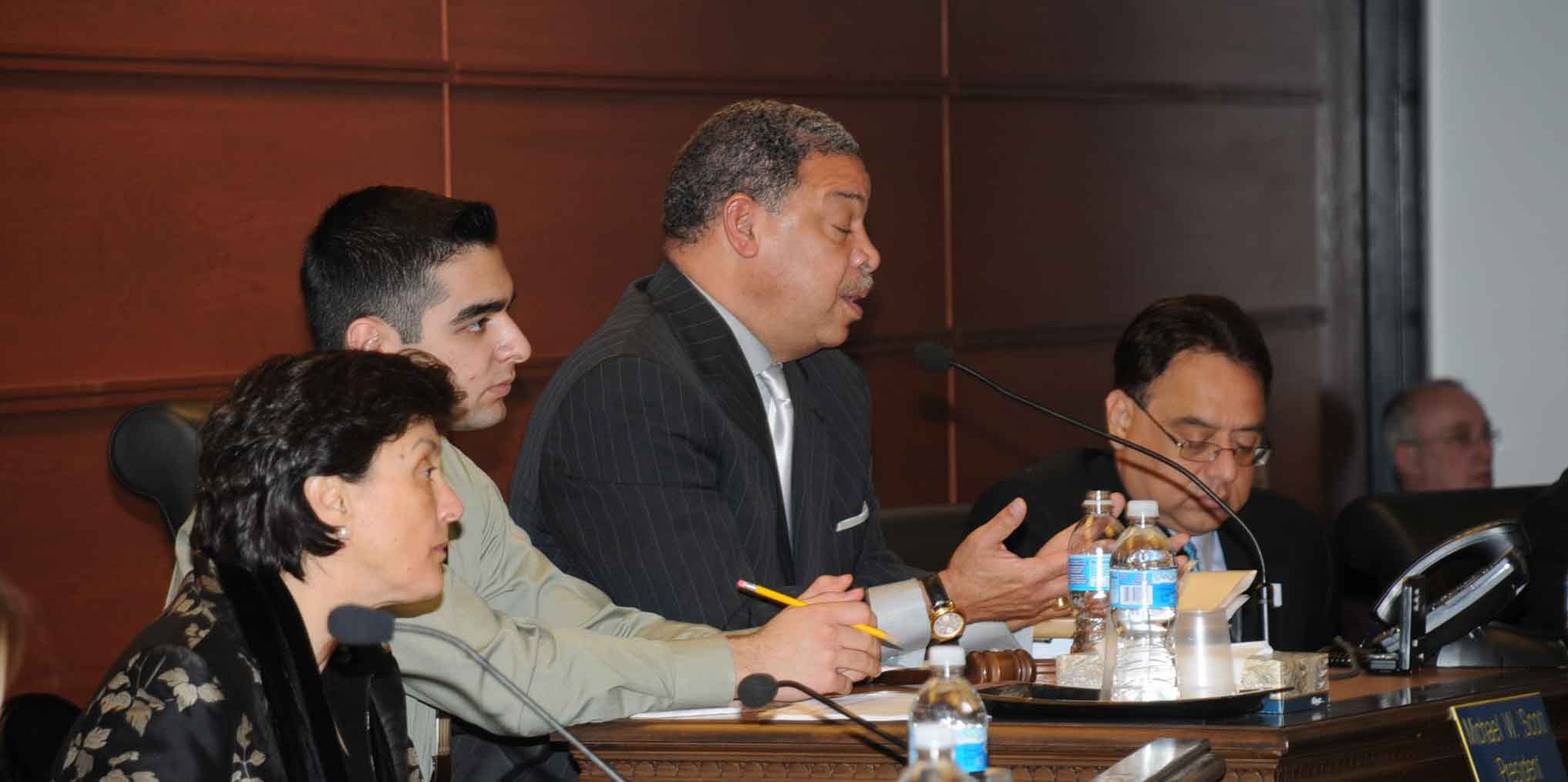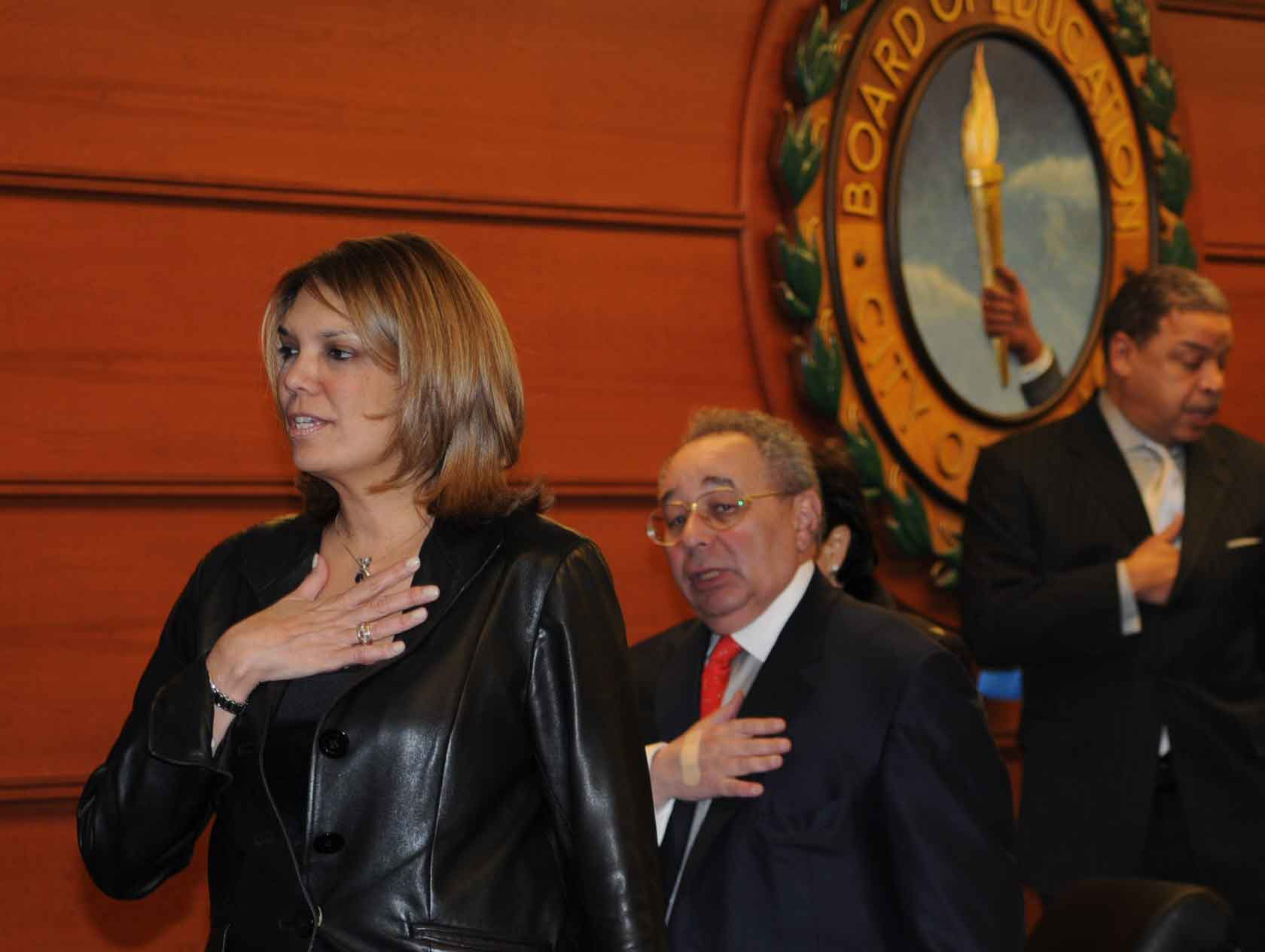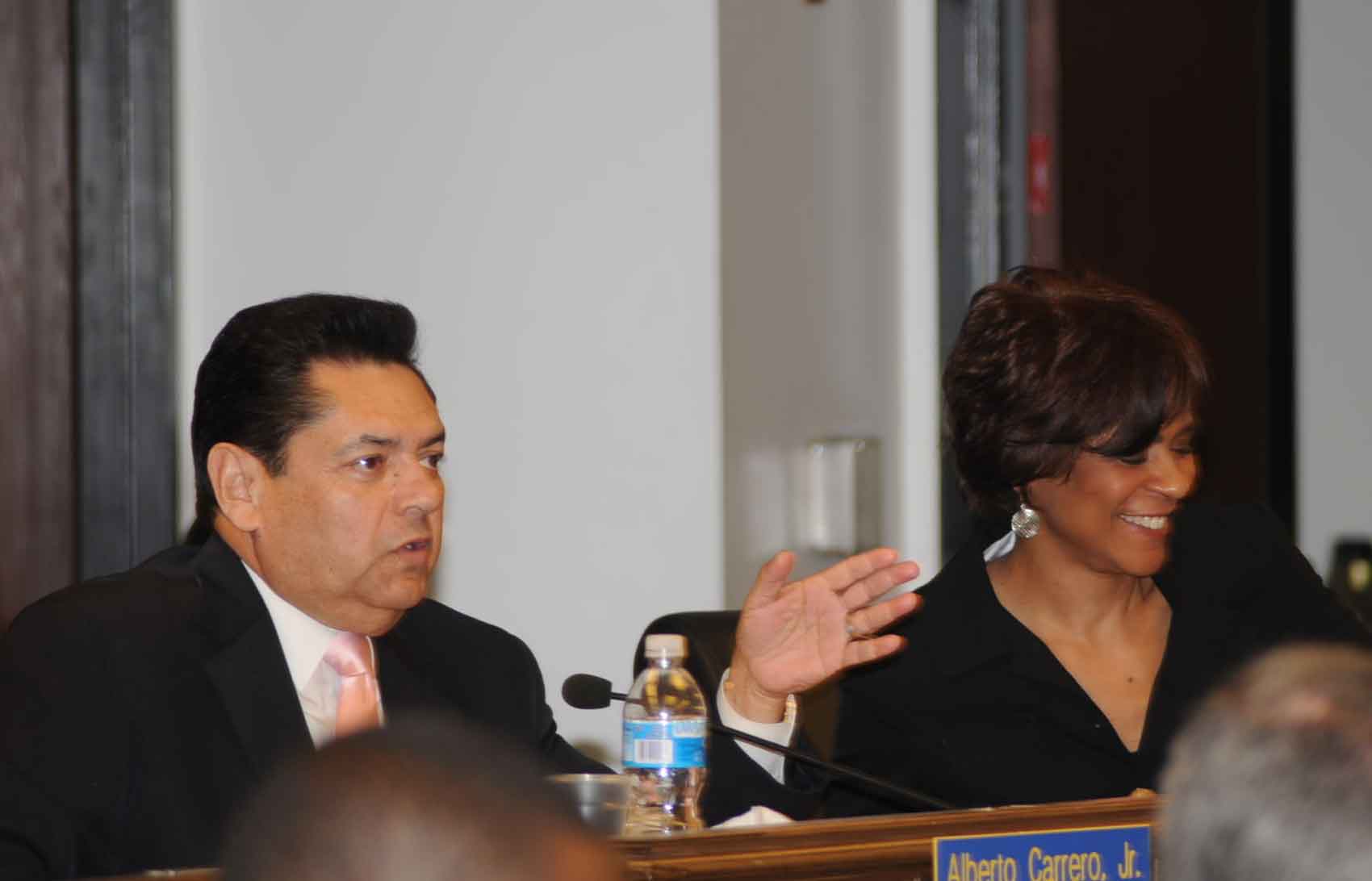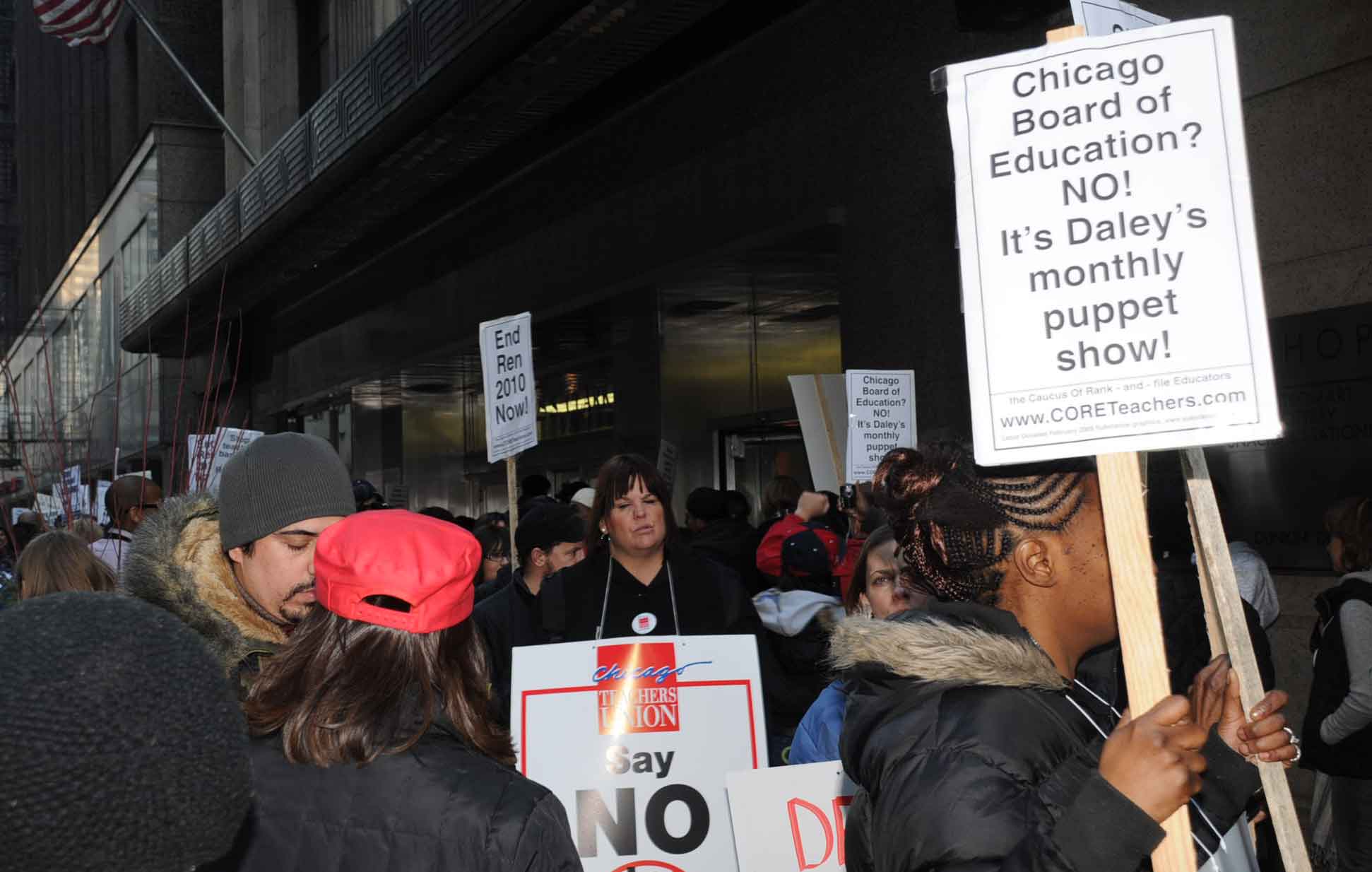Millionaire school board members vote themselves a pay raise
The supposedly "unpaid" members of the Chicago Board of Education voted themselves a pay raise at their March 25, 2009, meeting, after holding a public meeting that excluded hundreds of members of the public, many of whom work full-time for less money than the President of the Chicago Board of Education will be receiving during the coming year for "expenses."
 Three of the seven members of the Chicago Board of Education during the March 25, 2009, Board meeting. Above (left to right) Board Vice President Clara Muñana, the "shadow student" Board member (not a voting member of the Board), Board President Michael Scott, and Board member Tariq Butt. Since the passge of the Amendatory Act by the Illinois General Assembly in 1995, all members of the Board of Education of the City of Chicago have been appointed by Mayor Richard M. Daley. Substance photo by George N. Schmidt.Without discussion or debate, after coming out of executive session at 3:30 p.m. on March 25, six of the seven members of the Chicago Board of Education voted in favor of an agenda item entitled "Board Report 09-0325-PO1 "Amend Board Report 06-0222-PO 1 Policy on Expense Reimbursement of Board Members." The Board Report (the form in which a motion comes before the Chicago Board of Education) raised the monthly "expense allowance" for six members of the Board from $1,000 per month to $2,000 per month, and for the Board President from $1,600 per month to $3,000 per month. The new policy goes into effect April 1, 2009.
Three of the seven members of the Chicago Board of Education during the March 25, 2009, Board meeting. Above (left to right) Board Vice President Clara Muñana, the "shadow student" Board member (not a voting member of the Board), Board President Michael Scott, and Board member Tariq Butt. Since the passge of the Amendatory Act by the Illinois General Assembly in 1995, all members of the Board of Education of the City of Chicago have been appointed by Mayor Richard M. Daley. Substance photo by George N. Schmidt.Without discussion or debate, after coming out of executive session at 3:30 p.m. on March 25, six of the seven members of the Chicago Board of Education voted in favor of an agenda item entitled "Board Report 09-0325-PO1 "Amend Board Report 06-0222-PO 1 Policy on Expense Reimbursement of Board Members." The Board Report (the form in which a motion comes before the Chicago Board of Education) raised the monthly "expense allowance" for six members of the Board from $1,000 per month to $2,000 per month, and for the Board President from $1,600 per month to $3,000 per month. The new policy goes into effect April 1, 2009.
Accounting for the expenses is easy. According to the policy passed by the Board: "A proper voucher shall be submitted evidencing the necessity for the expense allowance. The voucher for the expense allowances shall be submitted to the President of the Board for verification and approval. No other accounting or receipts for particular expenses shall be required. The expense allowance shall cover all expenses incurred by a Board member while in the performance of their duties except for expenses as specified in Sections 3 and 4 of this Policy."
Section 3 of the Policy states that the Board shall pay for "Out-of-Town Travel" in addition to the expenses paid for in the Policy. Apparently, the Board members also carry Board of Education credit cards, because Section 4 of the Policy states that "members may charge directly to the Board expenses for meals (not covered in Section 3 above) only as provided in this section..."
As has been traditional with the current Chicago Board of Education, the motion to raise the expenses for Board members was approved without discussion or debate as part of an omnibus roll call on more than a dozen items, each of which was identified only by a number (such as "PO1"). The public agenda provided at the Board's Website did not include the details of the change being proposed. A complete copy of the agenda required by law was only available to citizens who went to the Board's headquarters at 125 S. Clark St. in Chicago after 10:00 a.m. on Monday, March 23. The Illinois Open Meetings Act requires that the agenda be made public, but does not specify what the "agenda" is. Since the current Board of Education was established by the Amendatory Act of 1995 (giving Chicago Mayor Richard M. Daley control over Board appointments), the "agenda" published on the school board's Web site does not include the details of the agenda, but only the titles of each motion.
The Board voted unanimously to approve 75 out of 76 of the motions that came before it on March 25, 2009 without discussion or debate.
 Board of Education members Roxanne Ward (left), Norman Bobins (center) and Michael Scott (right) Pledge Allegiance at the opening of the Board of Education meeting following the Board's decision not to hear all of the people who signed up for public participation on March 25, 2009. Ward and Scott voted in favor of the motion to increase "expenses" for the members of the Board. Bobins abstained. Bobins certainly doesn't need the money. Now retired as CEO of LaSalle Bank, Chicago (which was sold to Bank of America last year), Bobins serves on several lucrative corporate boards of directors. Last year, for example, he acquired 27,902 share of Private Bankcorp (PVTB) at zero dollars per share as a result of his directorship, according to filings with the SEC. He also serves as a director for NICOR and other major corporations. On March 25, 2009, the PVTB shares Bobins acquired because of his directorship at PVTB were worth $422,000. According to one biography (provided by the Illinois Business Roundtable): "Mr. Bobins is the former Chairman of the Board at the Chicagoland Chamber of Commerce. He recently joined the executive board of the Auditorium Theatre Council and the board of directors of the Terra Foundation for the Arts. He continues to serve as a member of the Board of Education of the City of Chicago , where he was re-appointed in June 2002 to a third, four-year term. He is a member of the board of trustees of WTTW Communications, Inc. and The Field Museum and is Chairman of the Illinois Business Roundtable. He is also a trustee of the University of Chicago Hospitals. In addition, he serves on The Council on the Graduate School of Business at The University of Chicago, is a member of the Kellogg Graduate School of Management Advisory Board and serves on the boards of Spertus College and the Executive Council of Chicago Metropolis 2020. His corporate involvement includes the board of trustees of CenterPoint Properties Trust, the board of directors of the New York Clearing House, and directorships at RREEF America REIT II, Inc. and Transco, Inc. In addition, he is a member of the Banker’s Club of Chicago, serving most recently as president; The Financial Services Roundtable and the Civic Committee of The Commercial Club of Chicago. He is a former member of the Federal Advisory Council." Roxanne Ward is vice president of Ariel Capital Management. Substance photo by George N. Schmidt.One Board member (Norman Bobins) abstained on the vote to increase the pay for Board members.
Board of Education members Roxanne Ward (left), Norman Bobins (center) and Michael Scott (right) Pledge Allegiance at the opening of the Board of Education meeting following the Board's decision not to hear all of the people who signed up for public participation on March 25, 2009. Ward and Scott voted in favor of the motion to increase "expenses" for the members of the Board. Bobins abstained. Bobins certainly doesn't need the money. Now retired as CEO of LaSalle Bank, Chicago (which was sold to Bank of America last year), Bobins serves on several lucrative corporate boards of directors. Last year, for example, he acquired 27,902 share of Private Bankcorp (PVTB) at zero dollars per share as a result of his directorship, according to filings with the SEC. He also serves as a director for NICOR and other major corporations. On March 25, 2009, the PVTB shares Bobins acquired because of his directorship at PVTB were worth $422,000. According to one biography (provided by the Illinois Business Roundtable): "Mr. Bobins is the former Chairman of the Board at the Chicagoland Chamber of Commerce. He recently joined the executive board of the Auditorium Theatre Council and the board of directors of the Terra Foundation for the Arts. He continues to serve as a member of the Board of Education of the City of Chicago , where he was re-appointed in June 2002 to a third, four-year term. He is a member of the board of trustees of WTTW Communications, Inc. and The Field Museum and is Chairman of the Illinois Business Roundtable. He is also a trustee of the University of Chicago Hospitals. In addition, he serves on The Council on the Graduate School of Business at The University of Chicago, is a member of the Kellogg Graduate School of Management Advisory Board and serves on the boards of Spertus College and the Executive Council of Chicago Metropolis 2020. His corporate involvement includes the board of trustees of CenterPoint Properties Trust, the board of directors of the New York Clearing House, and directorships at RREEF America REIT II, Inc. and Transco, Inc. In addition, he is a member of the Banker’s Club of Chicago, serving most recently as president; The Financial Services Roundtable and the Civic Committee of The Commercial Club of Chicago. He is a former member of the Federal Advisory Council." Roxanne Ward is vice president of Ariel Capital Management. Substance photo by George N. Schmidt.One Board member (Norman Bobins) abstained on the vote to increase the pay for Board members.
The entire meeting took less than 15 minutes.
The raucous "public participation" portion of the meeting, which ended with more than 20 people not being allowed to speak, has lasted three hours, but is not considered a part of the Board meeting. The Board members actually begin the meeting after the "public participation" is over. No stenographic transcript is maintained until after the Board meeting is called to order following public participation, so the complete record of the testimony of thousands of people at hundreds of meetings of the Chicago Board of Education since 1995 has been erased from the official history.
'Unpaid' Board members paid more than 5,000 Board workers
A Substance analysis of recent Chicago Board of Education employment data shows that more than 5,000 employees of the Chicago Board of Education, many working full-time as cafeteria, teacher assistant, custodial, and security workers, are paid between $24,000 and $35,000 per year, the range now established for "expenses" for members of the seven-member Board of Education.
The preliminary analysis of worker salaries is based on the Board of Education's "Position File", a current listing of all employees of the Board with salary and work location. The Position File must be requested from CPS under a Freedom of Information Act (FOIA) request, rather than allowing the public to access the information on the Board's Web site, as is the case with almost all other school districts in Illinois.
Since the takeover of the Chicago Board of Education by Mayor Richard M. Daley following the passage of the Amendatory Act of 1995 by the (Republican controlled) Illinois General Assembly, the seven member school board has been appointed by the mayor. Daley appointments are made to ensure racial and ethnic "diversity" and economic homogeneity. All of the Board members appointed by Daley since 1995 have been extremely wealthy by Chicago standards, with most of them being or becoming during their public service millionaires.
 Chicago Board of Education members at the March 25, 2009, Board meeting, just before they voted to increase their annual expense accounts. On the left is Alberto Carrero Jr., who recently retired as a vice president of Chicago's Banco Popular. On the right is Peggy Davis, a former CPS Chief of Staff (at the beginning of the Duncan administration) who is currently an attorney for Exelon Corporation. Substance photo by George N. Schmidt. None of the members of the board appointed by Daley have had any experience in education, and all have been fierce partisans of privatization and other policies furthering the agendas of business groups such as the Civic Committee of the Commercial Club of Chicago (which published "Left Behind," the manifesto that created "Renaissance 2010") and the Illinois Business Roundtable. All major appointments to executive positions in Chicago's public schools are cleared with the city's business elite.
Chicago Board of Education members at the March 25, 2009, Board meeting, just before they voted to increase their annual expense accounts. On the left is Alberto Carrero Jr., who recently retired as a vice president of Chicago's Banco Popular. On the right is Peggy Davis, a former CPS Chief of Staff (at the beginning of the Duncan administration) who is currently an attorney for Exelon Corporation. Substance photo by George N. Schmidt. None of the members of the board appointed by Daley have had any experience in education, and all have been fierce partisans of privatization and other policies furthering the agendas of business groups such as the Civic Committee of the Commercial Club of Chicago (which published "Left Behind," the manifesto that created "Renaissance 2010") and the Illinois Business Roundtable. All major appointments to executive positions in Chicago's public schools are cleared with the city's business elite.
Wealth not disclosed; privatization costs kept secret
Despite local and state laws requiring financial disclosure and the revelation of possible conflicts of interest, the Website of the Chicago Public Schools contains almost no information about the numerous potential conflicts of the members of its Board of Education. The wealth, stock holdings, and corporate directorships of the Board members have to be uncovered through other sources of information. The members of the Board of Education have kept their primary discussion about school policy secret since the Daley takeover in 1995. The Board regularly votes to seal the record of "executive sessions" going back to July 1995, when the Daley administration first took over. Most Board of Education business meetings last less than one half hour, when agendas which often include more than 100 items are approved (as they were on March 15, 2009) unanimously and without discussion or debate.
Expansion of charter schools
CPS also keeps secret salary and other data for the more than 2,000 people now working in Chicago's charter schools. For the past ten years, the Chicago Board of Education has lumped charter school expenses into a budget line called "Contractual and Other Expenses" in the Board's $5 billion operations budget. A major factor in the expansion of Chicago's charter schools (which currently number more than 100 because of the multiple "campus" fiction) has been their fierce and sometimes illegal opposition to unions for their workers.
 One of the signs carried by pickets outside the February 25, 2009, Board of Education meeting noted that the Board members are all appointed by Chicago Mayor Richard M. Daley. Whether the Board members are Daley "puppets" or Daley is a puppet of the corporate interests represented on the Board, the Civic Committee, and the Illinois Business Roundtable is a question being debated among activists as the confrontations with the Board's radical privatization and union busting agendas grow in Chicago. Substance photo by George N. Schmidt.The public is denied all information about the expenses of charter schools in Chicago. The same information about employees of the Board of Education that is routinely public in every other school district in Illinois is kept from the public when Chicago's charter schools are concerned. The members of the Board of Education sometimes talk about "transparency", but their words are simply rhetoric. They are committed to maintaining the maximum amount of secrecy in their own deliberations and about their own financial interests.
One of the signs carried by pickets outside the February 25, 2009, Board of Education meeting noted that the Board members are all appointed by Chicago Mayor Richard M. Daley. Whether the Board members are Daley "puppets" or Daley is a puppet of the corporate interests represented on the Board, the Civic Committee, and the Illinois Business Roundtable is a question being debated among activists as the confrontations with the Board's radical privatization and union busting agendas grow in Chicago. Substance photo by George N. Schmidt.The public is denied all information about the expenses of charter schools in Chicago. The same information about employees of the Board of Education that is routinely public in every other school district in Illinois is kept from the public when Chicago's charter schools are concerned. The members of the Board of Education sometimes talk about "transparency", but their words are simply rhetoric. They are committed to maintaining the maximum amount of secrecy in their own deliberations and about their own financial interests.
A complete analysis of CPS salary ranges will be published in the April 2009 edition of Substance.
Final SubstanceNews posting March 27, 2009, 5:00 a.m. Please credit SubstanceNews.net if you wish to republish this story in whole or in part, including the following: "Copyright 2009 Substance, Inc. www.substancenews.net. Reprinted with permission."
Comments:
By: Marricat
Retired teacher
I agree with Lefty. There is no way to justify that kind of expense account in today's economy and there is no oversight agency to put limits on these kind of practices. WE NEED AN ELECTED BOARD IMMEDIATELY AND IN THE MEANTIME, THE UNION ATTORNEYS NEED TO STEP IN AND FILE AN INJUCTION TO KEEP THE INCREASES FROM GOING THROUGH.
By: Dan Priest
retired CPS
I have no idea what the fuss is. I went to the Pension board a year before retiring, received an estimate of benefits and on the day to receive them, they were correct and on time and no , not ever any hassles. I was treated great and professionally


By: Lefty
holy guacamole
I thought 70 grand for cappuccinos was bad. This is AIG all over again. I worked too hard for my tax money to give it to millionaires. 2000 a month? That's my mortgage and utilities. We must have an elected board now. LSCs on the board!